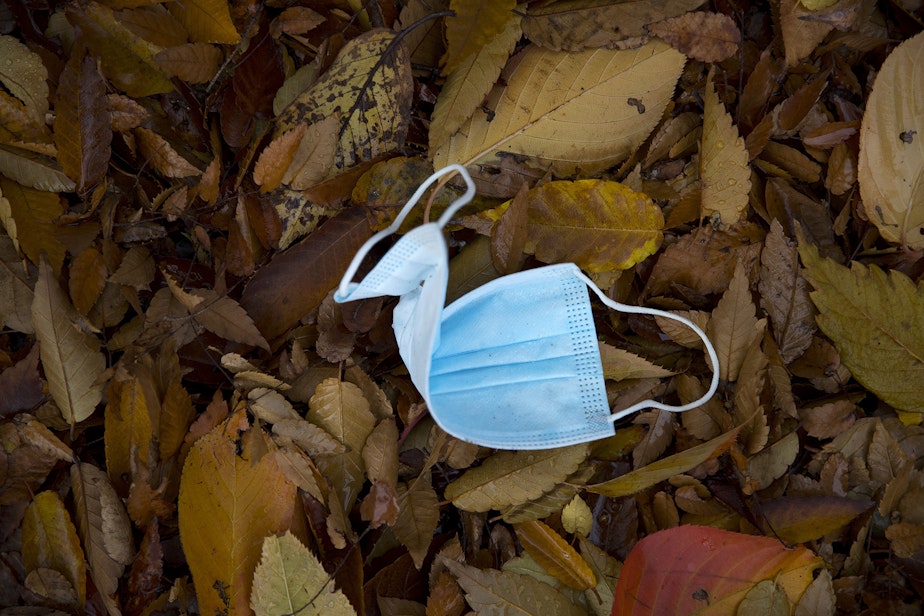What will you do as masking indoors becomes optional?

Washington's statewide indoor mask mandate lifts this weekend.
KUOW spoke with several members of the public to get a sense of what they plan to do and how they’re feeling as the pandemic enters this new phase.
Come Saturday, March 12, masks will be optional in places like grocery stores, gyms, houses of worship, and many other venues. But masks will still be required in some settings, such as on public transportation, in health care facilities, and anywhere that chooses to require them.
Concurrently, King County is also lifting its indoor masking requirements, which means people across the county will start making personal decisions this weekend about where they’ll mask, and where they won’t.
Some people are excited to take their masks off, others are nervous, and some don’t know how they feel about it yet.
At the University of Washington light rail station, many people said they would continue to cover their faces in public indoor settings.
“I will prefer to keep the mask on because I work in health care," said Candice Tran. "I prefer to have it on all the time to keep myself safe and my family safe."
Sponsored
Camille Overton said the indoor mandate ending isn’t thrilling, but “it is what it is."
“I personally wear a mask no matter what. Actually, at this point, I like wearing a mask. I like feeling anonymous,” Overton said.
Outside a grocery store in South Seattle, Fateya Arebu said she’ll continue to wear a mask until her two young children can get vaccinated.
"My concern is for my kids," Arebu said. "Even though medically they said that kids, if they have Covid, they are low risk, they get better faster than adults. But, still, I get scared."
Abshir Jama is a Lyft driver. Ride shares are technically public transportation, so masks will still be required there. But Jama worries that with so many places becoming mask-optional, it could become even harder to convince his customers to wear one.
Sponsored
"I can't force my customers," Jama said. "I’ve had a few incidents where customers say, 'Hey, I had a long flight. Is it okay if I take my mask off because I want to get fresh air?' And I just let them, you know?"
Jama said he plans to keep his mask on not just while he's working, but also while he's worshipping.
"The mosque’s really very strict because there are a lot of elderly people there," he said. "It’s crowded always."
KUOW spoke with others who indicated they’ll likely drop their mask.
“I’ll probably stop wearing it, but I won’t think less of somebody else who might continue to wear it," said a woman at the UW light rail station, who declined to share her name. "Especially if they’re concerned for their own health, or somebody that maybe lives with them, or somebody they might take care of.”
Sponsored
She said she and her family recently got Covid-19 so they feel they have an added layer of protection.
Sherwin Salva works in health care and will have to wear a mask at work.
He said he’s okay with people making their own choices and he’s looking forward to unmasking in some indoor public settings.
“At the gym most specifically, because working out and wearing a mask is kind of gross,” Salva said.
Salva said as long as nobody is coughing on him, or near him, he doesn’t mind if others take their masks off.
Sponsored
Still, for some people, this new phase leaves them questioning what the best course of action is.
“I’m actually not sure how I feel about it,” said Alex Cheatom.
“I still think the masks are needed; I don’t think we’re safe completely safe, yet. But at the same time, I think a lot of people are just tired of wearing them,” Cheatom said.
Cheatom said he’s probably not comfortable unmasking somewhere like the grocery store at this point.
Others said whether or not they choose to wear a mask will come down to what the people around them are doing.
Sponsored
Jay Wendt, an air traffic controller at SeaTac, said that’s how he’ll gauge things at places like grocery stores.
“It’s more of a polite thing, you know what I mean? Like holding the door open for somebody," Wendt said. "And there’s an ebb and flow of politeness, or what the expectations of people are."
He said even if everyone else drops their masks, he’ll continue to wear his in two situations: if he’s sick, or if he has plans to visit his parents, who he says are older and not in great health.





